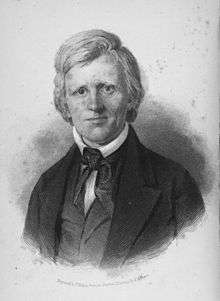Nathaniel Peabody Rogers
| Nathaniel Peabody Rogers | |
|---|---|
 Nathaniel Peabody Rogers | |
| Born |
3 June 1794 Plymouth, New Hampshire |
| Died | 16 October 1846 |
| Nationality | American |
Nathaniel Peabody Rogers (June 3, 1794 – October 16, 1846) was an American abolitionist writer who, from June 1838 until June 1846, served as editor of the New England anti-slavery newspaper Herald of Freedom.[1]
Biography
A native of the New Hampshire town of Plymouth, Nathaniel Peabody Rogers was the fifth child of Harvard-educated physician and poet, John Rogers (March 27, 1755 – March 8, 1814), and his wife, Betsy Mulliken. Young Nathaniel entered Dartmouth College in 1811 but, within a few months, suffered severe internal damage while participating in a game of football, and was forced to withdraw for a year of recuperation, with the injuries continuing as a source of pain for the remainder of his life, ultimately contributing to his death at age 52.[2] Returning to Dartmouth, he graduated in 1816, studied law with Salisbury attorney and future Massachusetts congressman Richard Fletcher until 1819, and was admitted to the New Hampshire Bar that year.
In 1838, giving up a lucrative 19-year legal practice in his native Plymouth and moving to Concord, he became editor of the abolitionist newspaper Herald of Freedom, to which he had been contributing articles since its 1835 founding by the New Hampshire Anti-Slavery Society. His editorial writings, noted for an impulsive, unaffected and witty, sometimes sarcastic, style as well as for poetic descriptions of nature, were widely reprinted in New York Tribune and other anti-slavery newspapers, under pen name "The Old Man of the Mountain".[3] In 1840, he represented New Hampshire abolitionists in London at the World Anti-Slavery Convention, but he withdrew in protest when the Convention refused to seat American women delegates. He did however appear in the painting that recorded the convention.[4] Returning to America and finding himself widely praised for supporting equality of the sexes, as well as equality of color, he received offers to head major newspapers and became known as a public speaker on issues of temperance, women's rights and the abolition of slavery, in the process becoming the subject of Henry David Thoreau’s 1844 Dial essay, “Herald of Freedom”, which Thoreau revised for its 1846 republication in memoriam of Rogers.[5]
Four months before his death, sensing failing health, Rogers wrote to his old friend, the poet John Greenleaf Whittier, "I am striving to get me an asylum of a farm. I have a wife and seven children, every one of them with a whole spirit. I don't want to be separated from any of them, only with a view to come together again. I have a beautiful little retreat in prospect, forty odd miles north, where I imagine I can get potatoes and repose,—a sort of haven or port. I am among the breakers, and 'mad for land.' If I get this home,—it is a mile or two in among the hills from the pretty domicil once visited by yourself and glorious Thompson,—I am this moment indulging the fancy that I may see you at it before we die." Whittier published a posthumous profile of his anti-slavery compatriot as a chapter in the 1850 literary collection, Old Portraits and Modern Sketches.[6]
Notes
- ↑ Compendium of writings by and about Nathaniel Peabody Rogers
- ↑ Pierpont, John (1849). Introduction to Nathaniel Peabody Rogers: Miscellaneous Writings
- ↑ Profile of Nathaniel Peabody Rogers at New Hampshire Division of Historical Resources
- ↑ The Anti-Slavery Society Convention, 1840, Benjamin Robert Haydon, 1841, National Portrait Gallery, London, NPG599, Given by British and Foreign Anti-Slavery Society in 1880
- ↑ Lewis, Alan. 2004 Biography of Nathaniel Peabody Rogers from Hutchinson Family reminiscences excerpted in New England Music Scrapbook (includes link {within chapter 2 of Parker Pillsbury's Acts of the Anti-Slavery Apostles} to photograph of Rogers' gravestone in Concord Cemetery) at the Wayback Machine (archived October 27, 2009)
- ↑ Biographical reminiscence of Nathaniel Peabody Rogers in John Greenleaf Whittier's Old Portraits and Modern Sketches
References
- Rogers, N.P. (1847). A Collection from the Newspaper Writings of Nathaniel Peabody Rogers. Concord, N.H.: John R. French
- Pillsbury, Parker (1881). "Nathaniel Peabody Rogers", Granite Monthly, vol. 4, no.7 (April).
- Bell, Charles H. (1894). The Bench and Bar of New Hampshire
- Stearns, Ezra S. (1906). History of Plymouth, New Hampshire